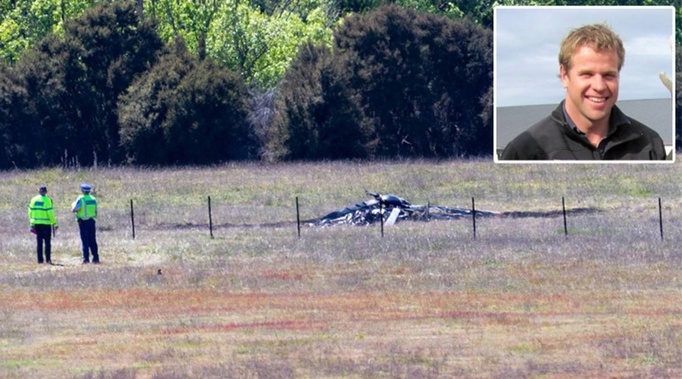
A single pair of overalls could have contributed to the triple helicopter tragedy in Wanaka last month, the Herald has been told.
While crash investigators remain tight-lipped about the October 18 crash that killed pilot Nick Wallis and Department of Conservation (DoC) rangers Paul Hondelink and Scott Theobald, the Herald understands they're following strong leads over a possible contributing cause.
It's believed that the occupants of a trailing helicopter belonging to another local firm who were heading off from Wanaka Airport on the same tahr cull operation, saw clothing being sucked out of the machine and wrapping around the tail rotor. The debris then caused the machine to become unbalanced in flight.
The tail section of the Hughes 500 (ZK-HOJ), leased by the Wallis family company Alpine Helicopters, broke away before the chopper crashed into an open paddock near the Clutha River, just 1.5km after take-off, and burst into flames. There were no survivors.
The tail section was found more than 100m away from the charred wreckage.
The tragedy came less than three months after married father-of-two Nick Wallis' brother Matt Wallis, 39, died in a chopper crash nearby.
/arc-anglerfish-syd-prod-nzme.s3.amazonaws.com/public/443A4WHDI5E73LKWTWB7JYHGYA.jpg)
The Transport Accident Investigation Commission (TAIC) has launched a probe.
Investigators refused to comment when approached by the Herald, saying its inquiry "continues in the evidence gathering phase".
Multiple sources told the Herald that clothing – either overalls or possibly a jacket – was seen flying out of a door and that it was being investigated as a possible contributing factor to its catastrophic failure.
A source close to the Wallis family said they were aware of the potential scenario.
Eldest brother Jonathan Wallis said he had heard "a number of potential sequences that may have happened".
But his family, including patriarch Sir Tim Wallis, who founded the popular Warbirds Over Wanaka airshow and who himself has survived a reported 15 air crashes, were comfortable to let TAIC's "meticulous and thorough" probe run its course.
/arc-anglerfish-syd-prod-nzme.s3.amazonaws.com/public/KO6SP7Y7RJDFFIYQZC4I76DV2E.jpg)
"TAIC's role is to disprove rather than prove theories and as a family we are confident that they will find out what happened," Jonathan Wallis said.
"Even though we were leasing the helicopter and it was my brother in the accident, we just have to accept that process, and we respect it.
"There are a number of different theories but I'm certain that given what they've got in front of them that they will find out what happened and they should find it at an early stage rather than a later stage."
International helicopter expert Claude Vuichard said in-flight break-ups were rare.
Debris from the machine wrapping around the tail rotor and causing it to become unbalanced is "absolutely possible", he said.
It's not clear whether the doors had already been removed for the hunting job, or whether they would've been taken off closer to the area of operations. Flying safety protocols call for all loose articles to be secured.
/arc-anglerfish-syd-prod-nzme.s3.amazonaws.com/public/3XGOTFH37VCNRAUFB7EKRFFGJE.jpg)
DoC director-general Lou Sanson declined to comment. A DoC spokeswoman referred enquiries to TAIC, saying "it is not appropriate for DoC to be commenting while the TAIC investigation is underway".
The wreckage and debris were removed from the crash site within days and taken to Wellington for forensic examination.
CCTV footage was recovered from Wanaka Airport and witnesses have been interviewed.
TAIC lead investigator Barry Stephenson earlier described the inquiry as "a big jigsaw puzzle," which typically would take 18-24 months to complete, although an interim report or urgent safety recommendations may be issued at any time if warranted.
A TAIC spokesman said evidence collection includes recording the accident scene, recovering wreckage, securing electronic records, and interviewing witnesses. Investigators also gather maintenance and other documents related to the operating company, while also seeking relevant information from overseas.
Take your Radio, Podcasts and Music with you









